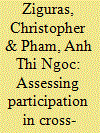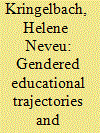| Srl | Item |
| 1 |
ID:
134162


|
|
|
|
|
| Publication |
2014.
|
| Summary/Abstract |
One of the limitations of research on global educational mobility has been the primary classification of key participants - students and educational institutions - in national terms. This paper tests the challenges involved in such methodological nationalism by examining the provision of cross-border education in one city. As Vietnam's commercial centre, Ho Chi Minh City (HCMC) has experienced rapid transformation over the past two decades as the country has moved steadily from a state-directed to a more market-driven and globally integrated economy. Since the late 1990s there has been a parallel growth in cross-border higher education in HCMC, through the outbound mobility of students and the provision of foreign programmes by international partnerships and branch campuses. Drawing on available data supplemented with insights gleaned from interviews and existing literature, this paper develops a methodology for identifying and quantifying the key features of each form of domestic, overseas and transnational provision. We estimate that around 6% of HCMC's tertiary students are studying overseas and between 2% and 3% in foreign programmes delivered in the city. The rates of enrolment in overseas and transnational programmes by students in HCMC are thus far higher than for Vietnam as a whole, but still considerably lower than in those well-established cross-border education hubs, Hong Kong and Singapore. We argue that concerns about the growth of private education and inequalities in access may continue to limit the growth of transnational provision in HCMC.
|
|
|
|
|
|
|
|
|
|
|
|
|
|
|
|
| 2 |
ID:
185151


|
|
|
|
|
| Summary/Abstract |
Through international student mobility programs, such as Global Korea Scholarship (GKS), countries aim to influence international students’ beliefs about and attitudes toward the host country. In this article, we explore GKS’s role in bringing international students to the country and analyze changes in GKS students’ and alumni’s affective and cognitive evaluation of Korea after coming to the country. We compare results based on students’ and alumni’s length of stay, gender, and economic development level of their home country. Our findings suggest that after coming to Korea, GKS recipients evaluate Korea more positively in both affective and cognitive dimensions.
|
|
|
|
|
|
|
|
|
|
|
|
|
|
|
|
| 3 |
ID:
137924


|
|
|
|
|
| Summary/Abstract |
French colonialism resulted in the inclusion of large numbers of West Africans into French educational institutions. Furthermore, the Senegambian region has a long history of intermarriage with French citizens. This paper draws on this history to explore the interplay between migration, education and binational marriage over several generations of West African students, with a particular focus on Senegal. Students from Francophone countries continue to seek educational opportunities in France, but in recent years they have been increasingly affected by the tightening up of immigration policies. In this context, this paper suggests that marriage to a French spouse often plays an important role in the fulfilment of educational projects, and that this role is contingent on issues of gender and class. At times, however, tensions between marriage in France and social expectations back home end up compromising education altogether.
|
|
|
|
|
|
|
|
|
|
|
|
|
|
|
|